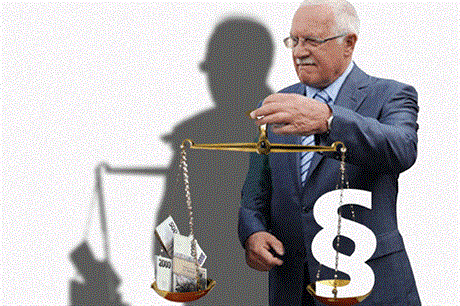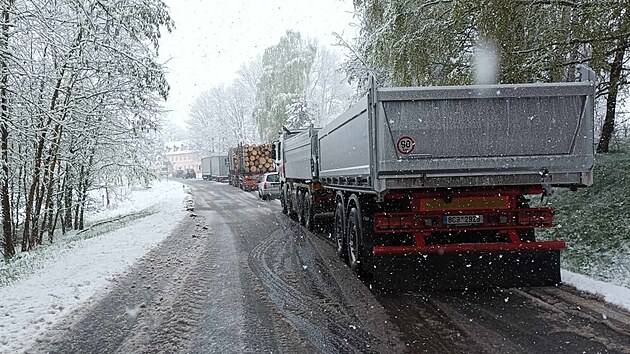A Czech doctor who last autumn went public with claims that a former policewoman convicted of bribery had boasted to him that a presidential pardon was in the works — thanks to a pay-off to President Václav Klaus and others at Prague Castle — has said he was hounded by authorities, pressured to resign, and compelled to move to another region to escape the harassment.
Dr Martin Konečný, then the senior doctor at a psychological clinic in Ostrov, near Karlovy Vary, had told the investigative weekly Respekt in October 2011 that two years earlier he had received for hospitalization a person convicted for accepting bribes. “Of her own accord she stated that a pardon was being ‘bought’ for her, for which a bribe of several million crowns had been paid to the president and his advisors. It’s exactly as I wrote in the medical record,” he said.
Although Konečný didn’t mention her by name in that interview, Respekt reported that the person in question was Radka Kadlecová, a former officer at the Karlovy Vary branch of the Foreigners Police office who was sentenced in 2009 to two years in prison for repeatedly taking bribes to help arrange Czech residency permits.
Kadlecová reportedly suffered a nervous breakdown when summoned to begin her prison sentence — which was subsequently delayed on medical grounds — and in September 2009 attended the Ostrov clinic where Konečný worked in order to gain a further postponement. It was then that the psychologist says she told him a presidential pardon was being arranged for her — for payment — and he dutifully set out to inform the authorities.
Pressured to quit
Czech law allows doctors to exceptionally break patient confidentiality in the event of suspected corruption. In comments published by the news server tyden.cz on on Friday, Konečný said that he had consulted with the hospital’s management about his intention to report the conversation with Kadlecová to the police. “However, when I asked about this option enormous pressure was immediately put on me to quit. And the methods used were very unscrupulous and dishonest,” he said.
Dr Konečný was first accused of bullying and intimidating his subordinates. But they all signed a petition refuting the accusation and demanding for him to be allowed to remain at his post.
Konečný said he was first accused by hospital management of bullying and intimidating his subordinates — but all those working directly under him at the Ostrov facility signed a petition refuting the accusation and demanding for him to be allowed to remain at his post.
He said the hospital management then offered him a large severance payment to leave quietly. “Nobody even verified the accusations against me; then the hospital’s statuary representative put forward the [severance] offer,” Konečný told tyden.cz
Although the psychologist did eventually resign his post, the hospital refutes that he was pressured to do so. “[His] work contract was terminated upon mutual agreement,” Ostov hospital’s director of healthcare, Jiří Štefan, told tyden.cz, insisting that Konečný’s departure had nothing to do with the Kadlecová case.
New pastures, more intimidation
Having quit his job at the Ostrov hospital, moved away from the Karlovy Vary region and gained temporary employment at a clinic for people with long-term illnesses, Konečný filed a criminal complaint about the alleged payment for Kadlecová’s clemency — and spoke to the press. And more problems followed.
“On the very day the article was published in Respekt [on Oct. 17, 2011], the management [of the clinic] contacted me and told me I must leave immediately. Then, within three days, all sorts of institutions contacted me with enquiries about tax declarations, bank accounts and for a plumber to be allowed access to my apartment,” Konečný told tyden.cz.
Konečný says his actions led to intimidation in his new home village in the form of an anonymous letter sent to locals stating that a local resident was to be murdered.The police called the psychologist in for questioning about his criminal complaint. “They asked me about contacts with journalists, who I had met with, whether we had met in person or had communicated in writing. They were interested in the media aspect, but not at all about what took place at the hospital,” Konečný told the news server.
Konečný says his actions also led to intimidation in his new home — in a village and region he did not reveal — in the form of an anonymous letter sent to locals stating that a local resident was to be murdered. “I didn’t receive it and found out about it from the Internet. It caused a big uproar, and I realized that it related to my case,” Konečný said.
Controvery over Klaus’ pardons
Jaroslav Ibehej, spokesman for the Presidium of the Czech Police, told tyden.cz that the investigation into the Kadlecová case was being conducted according to standard procedures. “The case is in the stage of verification. We are working on it intensively and our procedures are being monitored by the state prosecution service,” he said.
Regardless of the ongoing criminal investigation into the alleged payment for Klaus’ pardon, this Valentine’s Day, the presidential administration announced 14 pardons and one reportedly “provisional” pardon, two of which in particular provoked an outcry and questioning of the presidential powers.
The presidential administration has repeatedly refused to divulge any information about the presidential pardons other than the official justifications given upon their announcement.
‘[The] president doesn’t explain and nobody checks on him. In other words, our president is something like a monarch.’
According to lawyer Hana Narvanová, however, the presidential administration — as a public institution — is obliged by law to provide non-classified information requested by journalists, even though the president could not be brought to account for failing to do so. “But that does not mean the laws of the land do not apply to him,” she told tyden.cz.
Senator Alena Dernerová (unaffiliated) also had presumed that, given her position, Klaus’ team at Prague Castle would be oblige her request for information as to how exactly the Czech president has decided whom to pardon more readily that it would members of the press.
“I expected that if I, as a constitutional functionary, turn to the president with a relatively trivial enquiry, I would receive a reply. However, the only thing I found out was that the president doesn’t explain and nobody checks on him. In other words, our president is something like a monarch,” Senator Dernerová told the news server.




